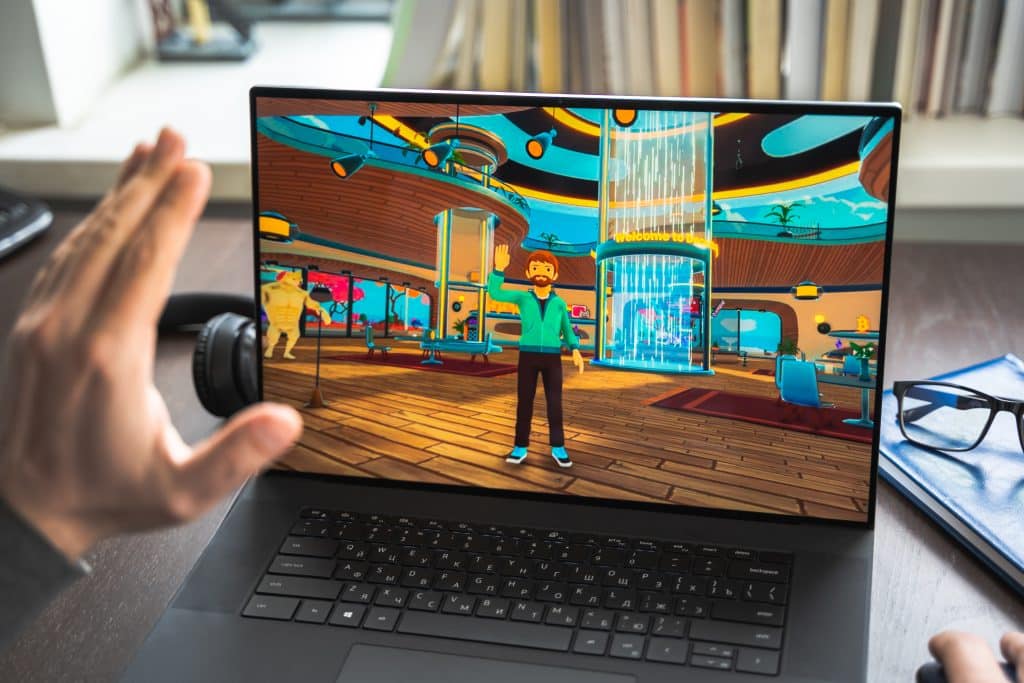Numerous companies are utilizing the metaverse as a new and barely-regulated way to promote their products. Although major brands like Miller Lite, Estee Lauder, Wendy’s and JPMorgan Chase & Co are already setting up shop in the digital realm, there seems to be some keen advantages to advertising this way for those who work in the cannabis industry as well.
Because the metaverse operates on a Web3 decentralized platform, there is no corporate control or censorship, leaving cannabis companies freer to market their products in ways they would not be able to on say, Facebook or Instagram. According to Lisa Buffo, founder and chief executive of the Cannabis Marketing Association, “It is a wide-open space in Web3… regulators haven’t wrapped their heads around it yet.”
To stay current on everything important happening in the cannabis and psychedelics industries, subscribe to The Cannadelics Weekly Newsletter. Also, it’ll get you premium access to deals on cannabis flowers, vapes, edibles, and much more! We’ve also got standout offers on cannabinoids, like HHC-O, Delta 8, Delta 9 THC, Delta-10 THC, THCO, THCV, THCP & HHC, which won’t kill your bank account. Head over to our “Best-of” lists to get these deals, and remember to enjoy responsibly!
What is the Metaverse?
By now most people have, at the very least, heard the word “Metaverse” – whether in the context of Mark Zuckerberg’s Facebook rebrand, or when NFTs briefly had their moment in the limelight, and so on. But what exactly is the metaverse? Different explanations have been offered up, from the metaverse being a sort of virtual universe where we use an avatar to navigate a fake world, to it being simply a way to categorize various extended reality technologies.
Actually, the term “metaverse” was first coined in a sci-fi novel written by Neal Stephenson in 1992, titled Snow Crash. In the book, Stephenson describes the metaverse as a type of digital parallel universe. Today’s metaverse bears some similar concepts, but overall is based on the idea of Web3, or third generation internet in which everything is operated on decentralized blockchain technology.
“The metaverse is a 3D version of the Internet and computing at large,” Mathew Ball, a venture capitalist and angel investor who’s written a series of essays about the potential and structures of the metaverse, told VICE. “There are two ways to place this in the current context,” Ball added. “When these two technologies (internet and computing) first emerged, all interactions were primarily text-based (emails, messages, usernames, email addresses). Then they slowly became more media-based (photos, videos, livestreams). The next elevation of user interface and user experience is into 3D. Secondly, if we think of [a] mobile [phone] as placing a computer in our pocket and the internet being available at all times, think of the metaverse as always being within a computer and inside the internet.”
Many experts and Web3 stakeholders view the metaverse as a 3D version of the internet, where you engage in a digital life through your avatar and interact with others through their avatars. It’s a way to be social (kind of), more so than typing on a keyboard on some social media platform, but minus any true, real-life interactions.
Others, like cybersecurity expert and founding director of the Connecticut Institute of Technology at the University of New Haven, Ibrahim Baggili, don’t believe a true metaverse actually exists yet. “It’s not real at this stage, and won’t become real until people have a single location they can go to to get into in a virtual world they could live in,” Baggili claims.
Cannabis transactions in Decentraland
What is most appealing to cannabis companies about selling products in the metaverse, for the time being anyway, are the very lax advertising regulations compared other internet platforms. So far, only a handful of weed companies are buying up digital space, and only of these companies sells THC products.
For example, Higher Life CBD Dispesnary LLC, who partnered with partnered with Saucey Farms & Extracts LLC earlier this year, opened a store in Voxels last December. Voxels is a metaverse-style universe that used to be called Cryptovoxels until they rebranded last month. Although you can’t buy anything directly from their virtual store, you can click a cash register button in the meta dispensary which will redirect you to their website where you can make a purchase. According to Higher Life chief executive, Brandon Howard, roughly 1000 people visit the virtual dispensary every day.

Florida-based Kandy Girl, owed by Alina Boyce, is the first cannabis company that sells THC products to purchase virtual property in Decentraland. Her metaverse store is located at -55, -129. Every “parcel” that exists in the metaverse has its own coordinates/location so people can “teleport” there immediately.
However, according to chief marketing officer and owner of Boyce Capital LLC, Ben Boyce, there aren’t enough users yet to generate the necessary investor interest to take things to the next level. “When there’s a million people logged into a metaverse at any given time, that’s when it is going to make sense to staff [a virtual] dispensary with a real live human being,” Mr. Boyce said.
But until then, basically all the cannabis brands can do is take advantage of the advertising freedom they have in the metaverse compared to traditional advertising platforms like Facebook, Instagram, and Google. Metaverse platforms are different in that they have varying rules for how and what you can promote, depending on what world you’re in. For example, Roblox, Meta Horizon WOrlds, and Sandbox have banned cannabis companies, but Decentraland and Voxels support them.
“We have supported various NFT cannabis communities—as long as they meet the terms and conditions,” said Adam de Cata, head of partnerships at Decentraland. “Cannabis companies that open in Decentraland need to observe legal regulations, including not serving users in countries where the product is prohibited,” said Sam Hamilton, creative director of Decentraland Foundation, which builds tools for the platform and handles its marketing.
The consumer experience
The basics of shopping for pot products in the Decentraland metaverse go a little something like this: First, you launch the program on a desktop computer, create an avatar, and move through the virtual dispensary world where you can interact with other people’s avatars and buy products with your crypto wallet by scanning a QR code that takes you to the checkout site. There are multiple floors in the meta Kandy Girl store for customers to explore, including a large NFT gallery and a virtual rooftop party held earlier this year (yes, a party for avatars).
Founder Alina Boyce says, “A lot of these NFT projects people are investing in, either don’t end up delivering on their promises, or it just takes so long for the promises of these projects to be executed. It scares investors when they see the floor price of a NFT project start dropping. We’ve created a reason to stay.”
To get a better idea of the whole experience, I did a bit of exploring in Decentraland myself. First, I made an avatar and launched Decentraland, where I started off inside the Kandy Girl dispensary. There was an upper level but I did not have access because I entered the game as a guest. It was very rudimentary – which is understandable considering how new this digital world is.

After looking around a bit, I went outside and wandered where there was an array of different NFT artwork to look at, I walked some more and exited the app shortly after. I do find it extremely forward thinking of Kandy Girl to pursue this marketing avenue, as they are the first company to establish a digital metaverse dispensary that sells THC products. However, it will certainly need to be more entertaining if business owners wish to create an experience that’s worth repeating.
Final thoughts
As strange as it all sounds, the metaverse is trending so it’s no surprise that cannabis companies (an industry which has also been trending for the last few years) are eyeing these virtual business opportunities. An added bonus is that, in some of these digital worlds, they are free to advertise with much more leniency than they are in the real world. And although shopping and activities are still somewhat abysmal in decentraland and voxels, it will be interesting to see what the future holds.
Welcome to the site! Thanks for making it to CBDtesters.co / Cannadelics.com, the top internet spot offering up fully-rounded independent news covering the growing cannabis and psychedelics industries. Stop by frequently to stay up-to-date on these dynamic industries, and make sure to sign up to The THC Weekly Newsletter, to ensure you’re never late on getting the news.









